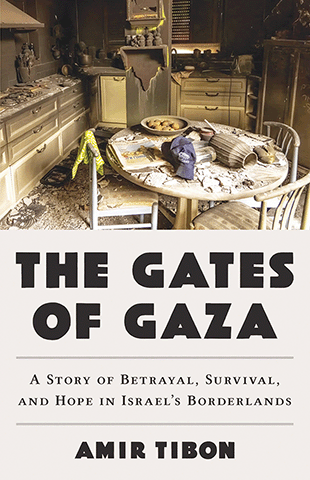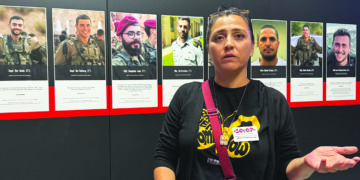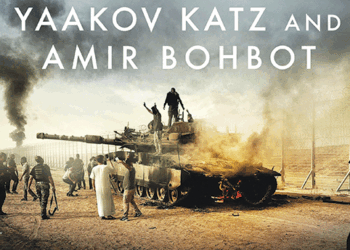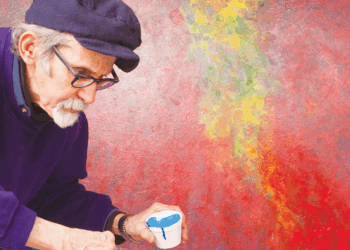Reviewed by NEAL GENDLER
Amir Tibon realized his family’s ordeal was over when he heard a loud bang on the steel plate covering their safe room’s only window and a voice from outside that daughter Galia immediately recognized as that of her grandfather.
It was late afternoon on Oct. 7, 2023. Amir, wife Miri and their young daughters had spent 10 pitch-black hours without food, with little water, rising temperature, decreasing oxygen and efforts to keep themselves and daughters Galia, 3, and Carmel, 21 months, silent amid sound of mortars and gunfire.
They heard Hamas invaders just outside talking while looking for Jews to kill or kidnap.
Early on, “Miri and I were separately but simultaneously gripped by a cold realization: We were in mortal and immediate danger.”
They lived in kibbutz Nahal Oz, about 450 people less than a mile from the Gaza fence. Mortars and rockets were nothing new; their daughters’ beds were in the safe room. But this time, “we heard shots being fired into our house.”
Hamas mortars had awakened Miri at 6:29 a.m. She and Amir, in their underwear, ran into the safe room, shut its heavy iron door and put up the steel window cover. Their only light and outside contact were from cellular telephones.
At 6:45, Amir’s father Noam, a retired major general who’d been swimming with wife Gali in Tel Aviv, sent a text asking about the situation in Nahal Oz. After Amir responded, Noam began calling his military contacts and at 8:30 told Amir: “We’re coming to get you out of there.”
That would be no small task as about 3,000 Hamas terrorists and Gazan looters were swarming Israel’s border communities. Along the way, Noam would find himself in combat and send Gali to drive three wounded soldiers to medical help.
Tibon’s The Gates of Gaza alternates easily between his family’s ordeal, those of fellow kibbutzniks, Nahal Oz’s founding by teenage Israeli soldiers in 1953 and Israel’s recent political situation.
Not a word of this is wearisome. Tibon, an award-winning diplomatic correspondent for Israel’s Haaretz newspaper, has been an English edition senior editor. His writing is fluid and, with extensive research, he masterfully crams a lot of information into a book as easy to read as a novel — and just as captivating.
Interviews provide a vivid account of what occurred that he didn’t see. Like other Gaza-border communities, Nahal Oz was on its own, defended by its members and an on-site military detachment of 10 that Hamas quickly reduced to five. Popular kibbutz security chief Ilan Fiorentino was killed early in the fighting.
Particularly heroic at Nahal Oz were Nissan Dekalo, deputy security chief; member Beri Meirovitch; and the five unwounded soldiers who raced around the kibbutz in an armored vehicle shooting intruders until the army arrived as their ammunition was running out and Nissan was suffering dehydration.
As Gali was driving Noam toward Nahal Oz in their Jeep Cherokee, they picked up a couple who’d fled the Nova music festival, took them to Ashkelon, then turned back toward the kibbutz.
At a junction about eight miles from Nahal Oz, Gali stopped. The road was strewn with corpses. She steered slowly between the bodies, stopping at a shelter outside a kibbutz still fighting and entering a shelter. When a small special-forces unit arrived, Noam offered to guide them to Nahal Oz. The commander refused, awaiting orders.
One of the soldiers, Avi, knew of Noam and offered to go with him. They left in Noam’s Jeep, Gali staying in the shelter. They didn’t know that a Jeep Wrangler with five soldiers was a few minutes ahead of them. It ran into an ambush. Noam and Avi soon arrived, followed by a vehicle with 10 soldiers.
Noam and Avi jumped from the Cherokee and dashed for cover behind the bullet-pierced Wrangler. The 10 soldiers followed and spread out. Three of the Wrangler soldiers were dead. Grabbing a dead man’s rifle and helmet, Noam shot two terrorists.
When the fight ended, three soldiers were wounded, one with blood pouring from his stomach. With them in his Cherokee, Noam sped back to the bomb shelter. Gali drove the Cherokee and its wounded to get medical aid.
Noam then spotted another retired major general parked in his white Audi. He drove Noam to Nahal Oz, where they encountered soldiers about to enter. Noam joined them in their house-to-house search. It was 4 p.m. Nahal Oz had lost 13 members and two foreign workers. Seven people were kidnapped into Gaza.
Kibbutz buildings were full of bullet holes and broken glass, bodies were all over the ground and in houses; in one, a husband, wife and two teenage daughters were found huddled together in their safe room — shot dead at close range.
Tibon and his wife had feared a similar fate.
Six hours into the invasion, the girls back asleep, “Miri and I finally let down our guard. … We had both taken pains to maintain our composure, knowing that any signs of distress from either one of us would make the girls even more scared than they already were. But now, all of our carefully restrained emotions came pouring out: the fear, the anger, the remorse.
“Whispering lest we wake the girls, I told Miri it was all my fault. … I never should have brought us here.” She replied that it was a mutual decision.
“With nothing left to say, I told Miri how proud I was of her — as a mother, a partner and a friend. ‘I love you, I love our daughters, I love our life together,’ she replied.
“For all we knew, these could be the last words we said to each other.”
***
Neal Gendler is a Minneapolis writer and editor.
(American Jewish World, December 2024)



















